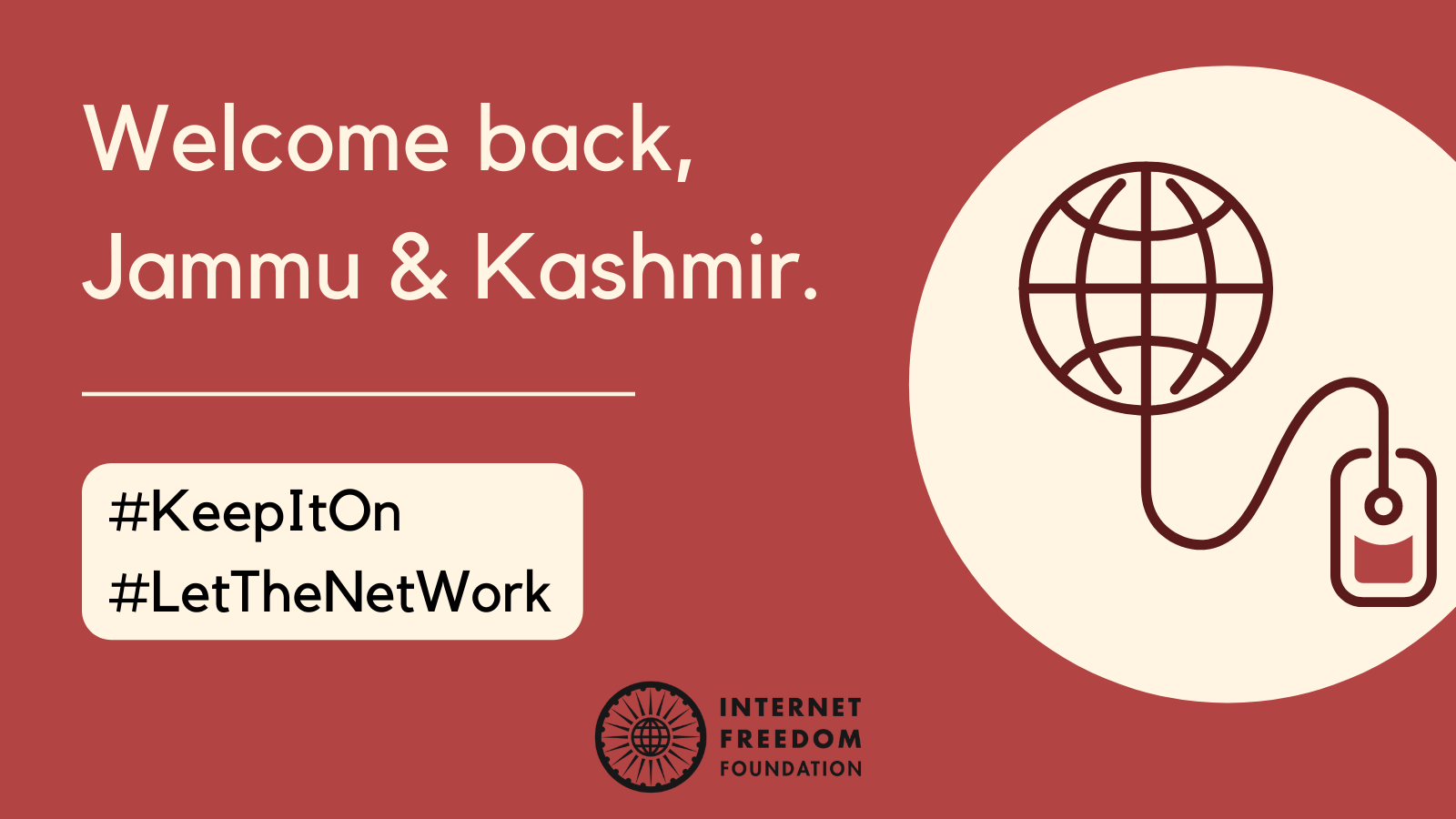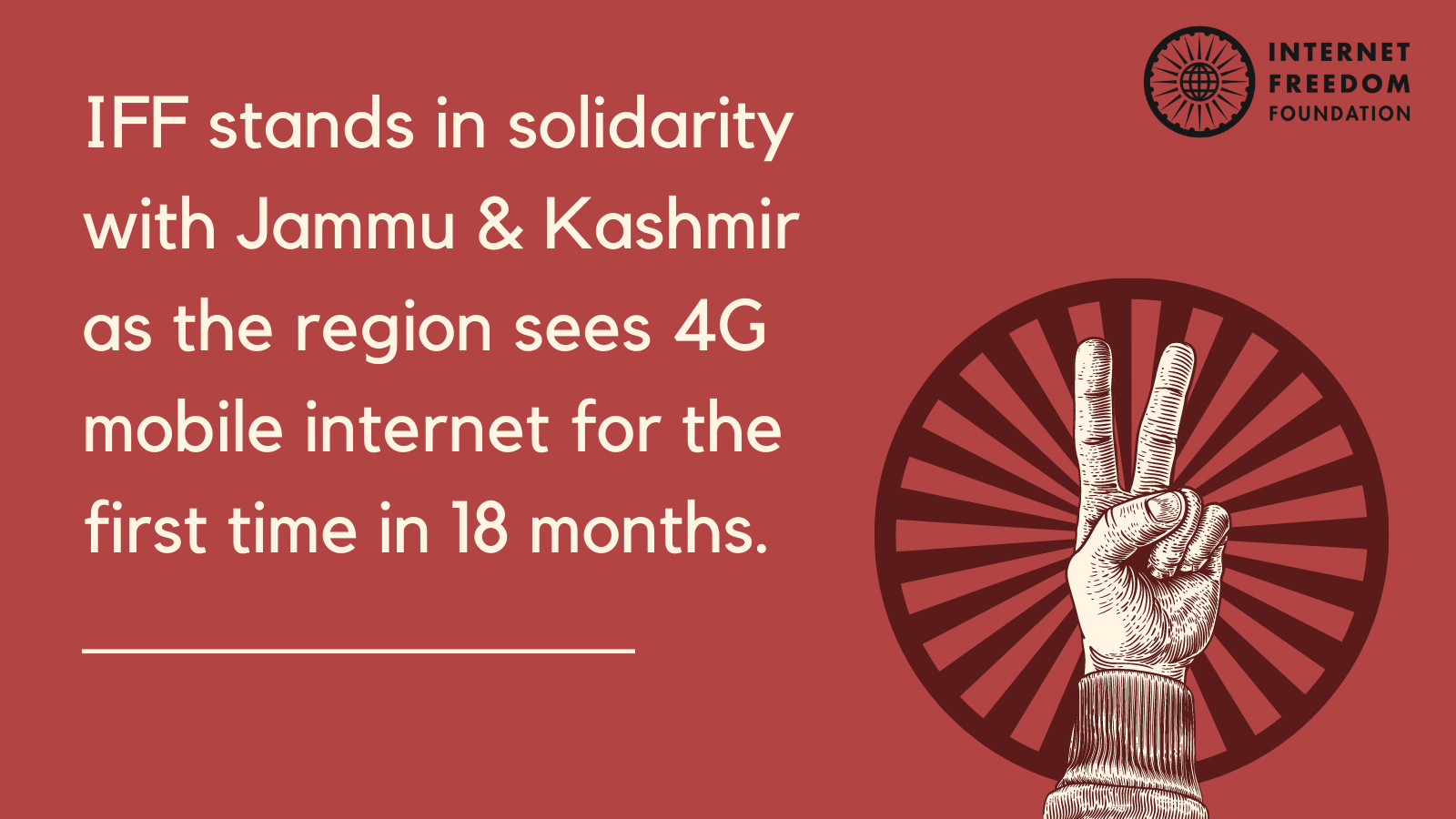
Yesterday i.e. 05 February 2021, the Jammu & Kashmir Government announced that it would be restoring 4G mobile internet services in all districts of Jammu & Kashmir. Till then, 4G mobile internet connectivity was only available in 2 out of 20 districts of Jammu & Kashmir, which were Ganderbal and Udhampur. The move follows international condemnation of the internet shutdowns being imposed near the borders of Delhi and in Haryana to suppress farmers' protests but it is also grounded in the research, reporting, public advocacy and strategic litigation carried on by local groups for the last one and a half years.
A complete communication shutdown was first imposed in Jammu & Kashmir on 05 August 2019 in the immediate aftermath of abrogation of Article 370 of the Constitution. During this time, all communication channels including landlines, voice calls, SMS services, fixed line internet and mobile internet were suspended. This communication shutdown was challenged by Anuradha Bhasin, the Executive Editor of Kashmir Times before the Supreme Court. Other journalist bodies including the Foundation for Media Professionals and the Indian Journalists Union intervened in the case to support Ms. Bhasin's challenge. Another petition was also filed by Ghulam Nabi Azad, the former Chief Minister of Jammu & Kashmir, who highlighted the impact of the communication shutdown on people's livelihood and income.
The Supreme Court delivered its judgement in Ms. Bhasin's and Mr. Azad's petitions on 10 January 2020 where it laid down progressive principles relating to necessity and proportionality of internet restrictions but stopped short of granting immediate relief. The government was directed to review its internet shutdown orders in accordance with the guidelines laid down by the Supreme Court, and in response, there was some relaxation in the internet restrictions. Initially, selective access was provided to whitelisted websites, and eventually, access was granted to all websites including social media platforms. However, mobile internet speed continued being slowed down to 2G which is hopelessly outdated and inadequate in this day and age.
With the outbreak of the COVID-19 pandemic, another round of litigation was initiated before the Supreme Court by the Foundation for Media Professionals since people in Jammu & Kashmir were unable to access telemedicine, online education, remote work facilities and virtual court hearings due to the internet slowdown. The Supreme Court delivered its judgement in this case on 11 May 2020 and established a Special Committee headed by the Secretary of the Ministry of Home Affairs to examine the necessity and proportionality of the internet restrictions in Jammu & Kashmir.
Since there was no information available in the public domain about the functioning of the Special Committee, a third round of litigation had to be initiated by the Foundation for Media Professionals seeking compliance with the Supreme Court's judgement. During the course of hearings in this contempt petition, the government revealed that the Special Committee had deliberated upon the issue and recommended staggered restoration of 4G mobile internet in low risk areas starting with one district in Jammu Division and Kashmir Division each. Subsequent to this, 4G mobile internet was restored in Ganderbal and Udhampur on 16 August 2020 but internet speed continued being slowed down to 2G in the remaining 18 districts.

Most recently, on 25 December 2020, the Private School Association of Jammu & Kashmir which represents over 3800 member schools in the region initiated a fourth round of litigation before the Supreme Court challenging the prolonged internet restrictions as violative of the fundamental right to education. Students in Jammu & Kashmir were already at a disadvantage due to prolonged school closures since 05 August 2019, and even during the COVID-19 pandemic, they had been unable to shift to online learning because of the internet speed restrictions. The petition was likely to be listed before the Supreme Court next week and the government has pre-empted another court hearing by restoring 4G mobile internet.
While the restoration of 4G mobile internet in Jammu & Kashmir was much needed and long overdue, it is important not to lose sight of the harm and losses that have been caused in the last 550 days. No citizen of a democracy should have to suffer through what the people of Jammu & Kashmir experienced, and going forward, we need to keep pushing for greater transparency and accountability to prevent this from happening again. We, at IFF, had the opportunity to provide legal assistance to the Foundation for Media Professionals, Indian Journalists Union and Private School Association of Jammu & Kashmir through multiple rounds of litigation. We fully intend to continue working on the broader issue of internet shutdown reform because there are still compliance failures with respect to proactive publication of internet shutdown orders.
As a parting note, we would like to acknowledge and thank the lawyers who have helped us provide legal assistance in these cases including Senior Advocates Huzefa Ahmadi and Dushyant Dave, Advocates on Record Shadan Farasat and Astha Sharma, Advocates Vrinda Bhandari, Jahnavi Sindhu, Bharat Gupta, Gautam Bhatia, Kajal Dalal, Abhishek Manchanda and Devdutta Mukhopadhyay. We would also like to extend our gratitude to Revati Laul who painstakingly collected personal testimonies of residents of Jammu & Kashmir and Prateek Waghre who provided a technical analysis of web performance at 2G v. 4G speed. There are many more people and organizations who have worked on this issue and we are glad IFF could play a small role in ending this gross violation of digital rights.
"The restoration of 4G internet access in Jammu and Kashmir is a welcome step and we commend the people there who have shown tremendous courage and dignity in this distressing period of deprivation and hopelessness. All of us here at IFF have each day kept you in our hearts, minds and work as we have represented clients including the Foundation for Media Professionals, the Indian Journalists Union and the Jammu and Kashmir Private Schools Association before the Hon’ble Supreme Court. This step would not have occurred without persistent efforts by a large team of activists, organisations, lawyers and senior advocates. Today, as we look forward with hope, much work remains to be accomplished. Our fundamental rights are inextricably linked with digital technologies and IFF commits to protecting them in an effective manner to advance our constitutional values of individual liberty, social justice and human welfare."
Apar Gupta, Executive Director, IFF
Important Links
- Previous post titled 'FMP's and IJU's intervention permitted in Anuradha Bhasin's petition' dated 01 October 2019 (link)
- Previous post titled 'SC's Kashmir communication shutdown judgement is just the beginning of a long uphill campaign' dated 10 January 2020 (link)
- Previous post titled 'SC issues notice in FMP’s petition seeking restoration of 4G internet services in Jammu & Kashmir during COVID-19 crisis' dated 09 April 2020 (link)
- Previous post titled 'Statement on Supreme Court's J&K 4G Decision : An incremental step towards restoration' dated 11 May 2020 (link)
- Previous post titled 'Supreme Court directs Govt to file its reply in FMP's contempt petition' dated 16 July 2020 (link)
- Previous post titled 'Govt agrees to staggered restoration of 4G mobile internet in J&K before the Supreme Court' dated 11 August 2020 (link)
- Live Law post titled 'Private Schools Association Moves SC Again Seeking 4G Restoration' dated 24 January 2021 (link)
- Previous post titled 'RTI responses from Andhra Pradesh and Gujarat show compliance failure with the Anuradha Bhasin Internet Shutdown decision' dated 10 November 2020 (link)
